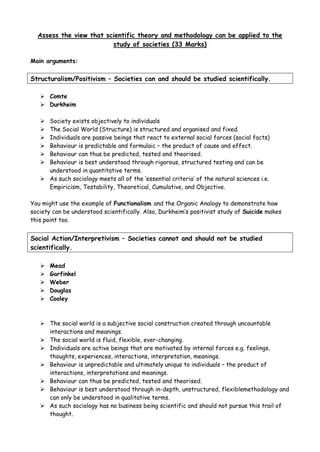
SociologyExchange.co.uk Shared Resource
- 1. Assess the view that scientific theory and methodology can be applied to the study of societies (33 Marks) Main arguments: Structuralism/Positivism – Societies can and should be studied scientifically. Comte Durkheim Society exists objectively to individuals The Social World (Structure) is structured and organised and fixed. Individuals are passive beings that react to external social forces (social facts) Behaviour is predictable and formulaic – the product of cause and effect. Behaviour can thus be predicted, tested and theorised. Behaviour is best understood through rigorous, structured testing and can be understood in quantitative terms. As such sociology meets all of the ‘essential criteria’ of the natural sciences i.e. Empiricism, Testability, Theoretical, Cumulative, and Objective. You might use the example of Functionalism and the Organic Analogy to demonstrate how society can be understood scientifically. Also, Durkheim’s positivist study of Suicide makes this point too. Social Action/Interpretivism – Societies cannot and should not be studied scientifically. Mead Garfinkel Weber Douglas Cooley The social world is a subjective social construction created through uncountable interactions and meanings. The social world is fluid, flexible, ever-changing. Individuals are active beings that are motivated by internal forces e.g. feelings, thoughts, experiences, interactions, interpretation, meanings. Behaviour is unpredictable and ultimately unique to individuals – the product of interactions, interpretations and meanings. Behaviour can thus be predicted, tested and theorised. Behaviour is best understood through in-depth, unstructured, flexiblemethodology and can only be understood in qualitative terms. As such sociology has no business being scientific and should not pursue this trail of thought.
- 2. You can use the examples of Symbolic Interactionism, Phenomenology and/or Ethnomethodology to demonstrate approach. Likewise, the work of Douglas, Atkinson and Wilkins on the Interpretivist study of suicide might be useful to demonstrate this also. Natural Sciences – Science is unique and society cannot and should not be studied scientifically Only Science meets the following criteria of being Empirical, Testable, Theoretical, Cumulative, and Objective. The work of Popper and Falsification is essential here. You could also use Kuhn’s argument that science is based on Universalism as well as Merton’s CUDOS Norms. The Sociology of Science – Science is not all that scientific anyway and to pursue the idea that science can explain everything is restrictive. Knorr-Cetina – The social construction of scientific knowledge Woolgar – The social construction of scientific knowledge Billig – Science can be restrictive C.Wright-Mills – The Sociological Imagination Bauman – Posy-Modern means all knowledge is valuable Khun – Scientific Paradigms and Revolutions Realism? In a question like this you are expected to; Fully elaborate on any points / arguments that bring in to the essay. Define key terms Alternate your arguments so that you are constantly evaluating and making comparisons / contrasts throughout. Stay focussed on the question by making references to it Be selective over which arguments to include – if you try and get everything in you’ll miss detail, start listing and being vague, and/ or run out of time.